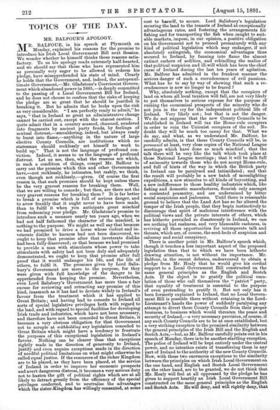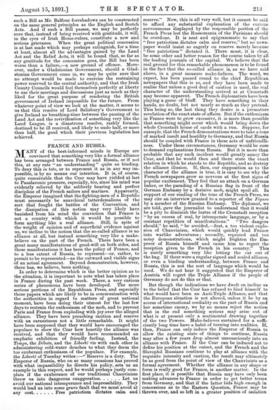TOPICS OF THE DAY.
MR. BALFOUR'S APOLOGY.
MR. BALFOUR, in his speech at Plymouth on Monday, explained his reasons for the promise to introduce his Irish Local Government Bill next Session.
We wonder whether he himself thinks those reasons satis- factory. To us his apology reads extremely half-hearted, and we should say that those who have represented him as personally very eager to be allowed to redeem his pledge, have misapprehended his state of mind. Clearly he holds that the Government, and, indeed, the antepenul- timate Government,—Mr. Gladstone's Coercionist Govern- ment which abandoned power in 1885,—is deeply committed to the passing of a Local Government Bill for Ireland, and he does not choose to confess that the risks of keeping the pledge are so great that he should be justified in breaking it. But he admits that he looks upon the risk as very considerable. "I am perfectly ready to admit," he says, "that in Ireland so great an administrative change cannot be carried out, except with the utmost caution. I quite admit that in a country seamed, chasmed, sundered into fragments by ancient party feuds, by feelings of mutual distrust,—smouldering, indeed, but always ready to burst into flame,—anything in the nature of large elective County Councils, are institutions which no statesman should recklessly set himself to work to build up." That is not the language of profound con- viction. Indeed, it seems to us the language of profound distrust. Let us see, then, what the reasons are which, in such a condition of things, compel Mr. Balfour to carry out the promise which this and other Governments have,—not recklessly, he intimates, but rashly, we think, even though not recklessly,—given. Of course the first reason is, that such promises should be kept unless there be the very gravest reasons for breaking them. Well, that we are willing to concede ; but then, are there not the very gravest reasons for breaking them ? It is far better to break a promise which is full of serious danger, and to avow frankly that it ought never to have been made, than to fulfil it when you anticipate great mischief from redeeming your pledge. Mr. Gladstone's promise to introduce such a measure nearly ten years ago, when we had not half fathomed the character of the mischief, is nothing to the purpose. We might as well say that because we had promised to drive a horse whose violent and in- veterate dislike to harness had not been discovered, we ought to keep that promise after that inveterate dislike had been fully discovered; or that because we had promised to provide a man with stimulants whose power to take stimulants with safety had not been duly and adequately demonstrated, we ought to keep that promise after full proof that it would endanger his life, and the life of others, to fulfil it. The promises given by Lord Salis- bury's Government are more to the purpose, for they were given with full knowledge of the danger to be apprehended from keeping the promise. Nevertheless, even Lord Salisbury's Government has more than a fair excuse for reviewing and retracting any promise of this kind, inasmuch as it has had to deviate widely in Ireland's favour from the treatment which it has applied to Great Britain ; and having had to concede to Ireland all sorts of special legislative privileges both with regard to the land, and with regard to special facilities for developing Irish trade and industries which have not been necessary, and therefore have not been conceded to Great Britain, it becomes a very obvious obligation for that Government not to scruple at withholding any legislation conceded to Great Britain which might have a tendency to frustrate the purposes of this exceptional legislation in Ireland's favour. Nothing can be clearer than that exceptions rightly made in the direction of generosity to Ireland, justify and even require exceptions made in the direction of needful political limitations on what might otherwise be called equal justice. If the resources of the richer Kingdom are to be placed, as they have been placed, at the service of Ireland in order to improve her economic prospects and avert dangerous distress, it becomes a very serious duty not to hasten the gift of political rights which are at all likely to detract greatly from the efficiency of the special privileges conferred, and to neutralise the advantages which the sister-Kingdom has willingly consented, at some cost to herself, to secure. Lord Salisbury's legislation, securing the land to the tenants of Ireland at exceptionally advantageous rates, and fostering the arrangements for fishing and for transporting the fish when caught to suit- able markets, impose, in our opinion, a positive obligation, on his Government not to proceed prematurely with any kind of political legislation which may endanger, if not absolutely extinguish, the economical advantages thus secured to Ireland, by fanning into flame the almost extinct embers of sedition, and rekindling the malice of that political suspicion and ill-will which has been the chief curse of Ireland during the last ten years of agitation. Mr. Balfour has admitted in the frankest manner the serious danger of such a recrudescence of evil passions. What has he to say by way of showing that such a re- crudescence is now no longer to be feared ?
Why, absolutely nothing, except that the occupiers of land on whom all local taxation will fall, are not very likely to put themselves to serious expense for the purpose of ruining the economical prospects of the minority who do not join in the cry for the independent political life of Ireland. Very likely not ; but that is not the danger. We do not suppose that the new County Councils to be established in Ireland will tax the Home-rule occupiers in order to ruin the Unionist occupiers of the soil. No. doubt they will be much too canny for that. What we do say, and what, as we understand Mr. Balfour, he- candidly admits, is that these County Councils will be, in personnel at least, very close copies of the National League meetings which have done so much mischief ; that the talk there will be very like the talk which took place at those National League meetings ; that it will be talk full of animosity towards those who do not accept Home-rule, and full of hints of the way in which the British party in Ireland can be paralysed and intimidated ; and that the result will probably be a new batch of moonlighting expeditions, a new stimulus to all kinds of boycotting, and a new indifference to those healthy industries which, like fishing and domestic manufactures, flourish only amongst a contented peasantry, and are undermined by bitter social suspicions and jealousies. Until there is reasonable ground to believe that the Land Act has so far altered the temper of the Irish people, that they begin instinctively to discourage that spirit of malicious interference with the political views and the private interests of others, which has hitherto prevailed so disastrously in Ireland, we can see nothing but rashness, and very blameable rashness, in reviving all those opportunities for intemperate talk and threats, which are, of course, the seed-beds of suspicion and calumny and social conspiracy.
There is another point in Mr. Balfour's speech which, though it touches a less important aspect of the proposed legislation than that to which we have been hitherto drawing attention, is not without its importance. Mr. Balfour, in the recent debates, endeavoured to obtain a pledge from Mr. Healy that he would give his cordial support to a Local Government Bill constructed on the same general principles as the English and Scotch Acts. If the object is to gratify the political emu- lation of those who call themselves the " patriot " party, that equality of treatment is essential to the purposa of even pretending to gratify it. But not only has it been formerly explained to Ireland, that no Local Govern- ment Bill is possible there without retaining in the Lord- Lieutenant's hands the power of suddenly paralysing any attempt to divert these County Councils from their proper business, to business which would threaten the peace and security of Ireland,—a very necessary provision, of course, if any such County Councils are to be at once established, but a very striking exception to the promised similarity between the general principles of the Irish Bill and the English and Scotch Acts,—but, as Mr. Balfour carefully points out in his speech of Monday, there is to be another startling exception. The police of Ireland will be kept entirely under the central power, and no intention exists of transferring them in any part of Ireland to the authority of the new County Councils. Now, with these two enormous exceptions to the similarity between the principles on which Irish Local Government on the one hand, and English and Scotch Local Government on the other hand, are to be granted, we do not think that Mr. Healy will feel at all oppressed by the pledge he has given to support heartily an Irish Local Government Bill constructed on the same general principles as the English and Scotch Acts. He will deny, and will rightly deny, that such a Bill as Mr. Balfour foreshadows can be constructed on the same general principles as the English and Scotch Acts. And if such a. Bill passes, we may be perfectly sure that, instead of being received with gratitude, it will, in the eyes of Irish Home-rulers, constitute a new and serious grievance. When the great political concession is at last made which may perhaps extinguish, for a time at least, almost all the advantages gained by the Land Act and the Relief Acts, it will be found that, so far as any gratitude for the concession goes, the Bill has been worse than a failure,—a, new ground of offence. More- over, under a Gla,dstonian Government, should a Glad- stonian Government come in, we may be quite sure that no attempt would be made to exercise the restraining power reserved to the central authority, and that the Irish County Councils would feel themselves perfectly at liberty to use their meetings and discussions just as much as they liked for the great purpose of rendering the British government of Ireland impossible for the future. From whatever point of view we look at the matter, it seems to us that this resolve of Lord Salisbury's Government to give Ireland no breathing-time between the passing of the Land Act and the revivification of something very like the Land League, is a disastrous resolve, rashly formed, destined to be ill received, and likely to undo half, or more than half, the good which their previous legislation has achieved.



































 Previous page
Previous page